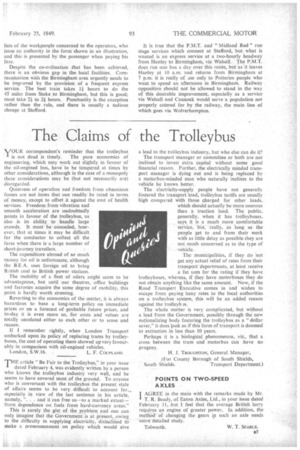The Claims of the Trolleybus
Page 15

If you've noticed an error in this article please click here to report it so we can fix it.
VOUR correspondent's reminder that the trolleybus is not dead is timely. The pure economics of 'engineering, which may work out slightly in favour of the oil-engined bus, have to be tempered at times by other considerations, although in the case of a monopoly these considerations may be (but not necessarily are) disregarded.
• Quietness of operation and freedom from obnoxious fumes are not items that can readily be rated in terms of money, except to offset it against the cost of health services. Freedom from vibration and smooth acceleration are undoubtedly points in favour of the trolleybus, 'as also is its ability, to handle large crowds. It must he conceded, how-, ever, that at times it may be difficult for the conductor to collect all the fares when there is a large number -of short-journey travellers.
The expenditure abroad of so much money for oil is unfortunate, although the B.E.A. uses foreign oil to bring British coal to British power stations.
The mobility of a fleet of oilers might seem to be advantageous, but until our theatres, 'office buildings -and factories acquire the same degree of mobility, this point is hardly worth stressing.
Reverting to the economics of the matter, it is always hazardous to base a long-term policy on immediate prices or on a forecast of probable future prices, and to-day it is even more so, for costs and values are totally unrelated either to each other Or to sense and reason.
If I remember rightly, when London Transport embarked upon its policy of replacing trams by trolleybuses, the cost of operating them showed up very favourably in comparison with oil-engined vehicles.
London, S.W.I6. L. F. COUPLAND.
JHE article "Be Fair to the Trolleybits," in your issue dated February 4, was evidently written by a person who knows the trolleybus industry very well, andhe seems to have covered most of the ground. To anyone who is conversant with the trolleybus the present state of affairs seems to be very difficult to account especially in view of the last sentence in his article, namely, ". . and it can free us—to a marked extent—' from dependence on fuels from hard-currency areas."
This is surely the gist, of the problem and one can • only imagine. that the Government is at present,..o,wing. to the difficulty in supplying electricity,' disinelined make a pronouncement on policy which would give
a lead to the trolleybus industry, but who else can do it?
The transport manager or committee or both are not inclined to invest extra capital without some good financial reason. .Further, the electrically minded transport manager is dying out and is being replaced by a motorbus-minded man who naturally inclines to the vehicle he knows better.
The .electricity-supply people have not generally fostered the transport load, trolleybus tariffs are usually high compared with those charged for other loads, which should actually be more onerous than a traction load. The public, generally, when it has trolIeybuses, . says it is a much . more. comfortable Service, but,. really, as long as the people get to and from their work with as little delay as possible they are not much concerned as to the type of
vehicle. •
The municipalities, if they do not get any actual relief of rates from their transport departments, at least receive a fat sum for the rating if they have trolleybuses, whereas, if they have motorbuses they do not obtain anything like the same amount. Now, if the Road Transport Executive comes in and wishes to escape from paying heay rates to the local authorities on a trolleybus system, this will be an added reason against the trolleybAs. .
The whole matter is very complicated, but without a lead from the Government, possibly through the new nationalizing body fostering the trolleybus as a "dollar saver," it does took as if this form of transport is doomed to extinction in less than 10 years.
Perhaps it is a biological phenomenon, .viz., that a cross between the tram and motorbus can have no progeny.
H. J. TROUGHTON, General Manager, .(For County Borough of South Shields; South Shields. Transport Department.)
POINTS ON TWO-SPEED AXLES I AGREE in the main with the remarks made by Mr.
T. R.. Beady, of Eaton Axles, Ltd., in your issue dated February II, but I feel that the average British lorry requires an engine of greater power. In addition, the method of changing the gears in such an axle needs more detailed study.
Totworth. W. T. SEARLE.




























